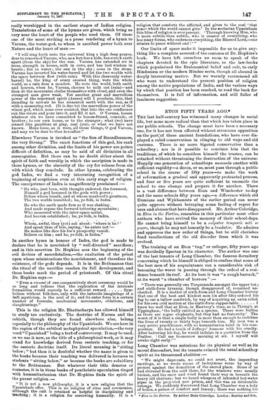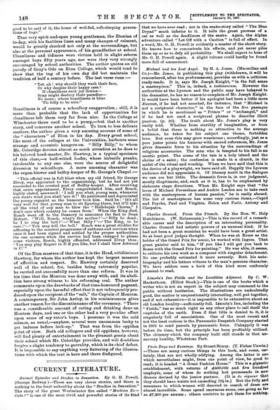ETON FIFTY YEARS AGO.*
THE last half-century has witnessed many changes in social life, but none more radical than that which has taken place in our public schools. The change must have been a necessary one, for it has not been effected without strenuous opposition on the part:of these ancient foundations, who have ever dis- played a rabid conservatism in clinging to old ways and old customs. There is no more bigoted conservative than a schoolboy ; nor is it possible to convince him that the traditions, of which he considers himself the trustee, can be attacked without threatening the destruction of the universe. Happily one generation of schoolboys succeeds another with sufficient rapidity—a dozen, or so, must pass through a public school in the course of fifty years—to make the work of reformation a gradual and apparently protracted process, and four or five years are quite sufficient to reconcile the school to one change and prepare it for another. There is a vast difference between Eton and Winchester to-day and the same schools fifty years ago,—a difference which old Etonians and Wykhamists of the earlier period can never quite approve without betraying some feeling of regret for uses and abuses that have disappeared. Mr. Arthur Coleridge, in Eton in the Forties, resembles in this particular most other authors who have revived the memory of their school-days. He cannot bring himself to be a eulpator temporis aeti se puero, though he may not honestly be a laudator. He admires and approves the new order of things, but he still cherishes fond recollections of the old disorder from which it was evolved.
The training of an Eton "tug," or colleger, fifty years ago was decidedly Spartan in its character. The author was one of the last tenants of Long Chamber, the famous dormitory concerning which he himself is obliged to confess that some of the best men of his acquaintance ran a considerable risk of becoming the worst in passing through the ordeal of a resi- dence beneath its roof. At its best it was "a rough barrack," at its worst "a chamber of horrors"
"There was generally one Torquemada amongst the upper ten; and sixth-form tyranny, though disapproved of, remained un- checked. It is a matter of sixth-form and Long Chamber history that one of the best and kindest men (in after life) ordered his fag to eat a tallow sandwich, by way of acquiring an extra relish for his own cold mutton at the sixth-form supper-table know too well that at Eton, in Hawtrey's time, as in Thring's at Uppingham, the bully existed as a species. There were bullies as there are rogue elephants, but they had no fraternity.' The worst of it is that a single bully is more than enough to embitter the lives of twenty or thirty boys beneath him. My man was a very active practitioner, with no humanitarian taint in his com- position. He had a touch of Jeffreys' humour with his cruelty. After battering his fag, he would indulge in a quotation from the Psalter. Call me to-morrow morning at six. I myself will awake right early.' "
Long Chamber was notorious for its physical as well as its moral discomfort, but its tenants evinced the usual schoolboy spirit at its threatened abolition :—
" We might deprecate, we could not avert, the impending sacrilege, so we wrote reams of lachrymose verse by way of protest against the demolition of the sacred place. Some of us had shivered from the cold there, for the windows were usually broken, and the snow and wind found their way in beneath the heavy old shutters; but we heard whispers of intended hot-water pipes in the prokcted new prison, and this was an intolerable outrage. We suddenly discovered that Long Chamber was a holy of holies, a palace of comfort and luxury; there was nothing too • Bton in the Fortiu. By Arthur Duke Coleridge. London; Bentley and Son.
good to be said of it, the home of well-fed, soft-sleeping genera- tions of tugs."
That very spick-and-span young gentleman, the Etonian of to-day, with his faultless linen and many changes of raiment, would be greatly shocked not only at the surroundings, but also at the personal appearance, of his grandfather at school. Cleanliness and tidiness were virtues held in slight esteem amongst boys fifty years ago, nor were they very strongly encouraged by school authorities. The author quotes an old parody of Gray's Ode on Eton College, which would tend to show that the tug of his own day did bat maintain the tradition of half a century before. The last verse runs :—
"Yet, ah ! why should they wash their face,
Or why despise their happy case ?
If cleanliness such joy denies— Soap might destroy their paradise—
No more ; where beastliness is bliss 'Tis folly to be nice."
Beastliness is of course a schoolboy exaggeration ; still, it is more than probable that the lack of opportunities for cleanliness left them very far from nice. In the College at Winchester there used to be a pump,—but that is another story, and concerns another school. To turn to less delicate matters, the author gives a very amusing account of some of the " characters" of Eton in his day. Every great school, like most of the colleges at the Universities, harbours some strange and eccentric hangers-on. "Silly Billy," to whom Mr. Coleridge devotes almost as much attention as he does to his beloved head-master, Dr. Hawtrey, is a typical specimen of this class,—a half-witted loafer, whose imbecile pranks, intolerable to any one else, were the source of delightful diversion to schoolboys. A more amusing character was the organ-blower and belfry-keeper of St. George's Chapel :— "This official was in full blast when my old friend, Sir George Elvey, was appointed to the organistship, but he had not yet succeeded to the coveted post of Belfry-keeper. After receiving that extra appointment, Elvey congratulated him, and Roach, highly elated, answered : ' I tell you what, young man, whenever you wants wind you shall 'ave it !' He patronised and depreciated the young organist as the humour took him. Said he : It's all very well for that young man to sit figuring there, but it'll take all the wind of any man to blow the "Hallelujah Chorus," I don't care which country he comes from.' When the King died, Roach went off to the Deanery to announce the fact to Dean
Hobart. 'Well, Roach, what's the matter ? Billy be dead ; be I to ring the bell ? What Billy ? The King, to be sure !'—` You may toll the bell.' Roach was a great stickler for adhering to the musical programme of anthems and services when once it had been signed and settled by the proper authorities. On one occasion when the service had been changed to please some visitors, Roach, highly offended, addressed Elvey thus : You may play Rogers in D if you like, but I shall blow Attwood in C.' "
Of the Eton masters of that time, it is the Head, niticlissimus Hawtrey, for whom the author has kept the largest measure of affection and respect. Dr. Hawtrey certainly deserved well of the school, for, besides being extremely popular, he carried out successfully more than one reform. It was in his time that the Montem was done away with, and its aboli- tion bore strong witness to his reforming zeal. The author comments upon the drawbacks of that time-honoured pageant, especially upon the harmful effect that it not infrequently pro- duced upon the recipient of the "salt," the Captain of Montem. A contemporary, Sir John Astley, in his reminiscences gives another reason for the discontinuance of the ceremony. "There was a considerable amount of eating and drinking done on Montem days, and one or the other had a very peculiar effect upon some of my tutor's boys. I presume it was the cold salmon, as usual,—anyhow, several were uncommon lucky to get indoors before lock-up." That was from the oppidan point of view. Both old collegers and old oppidans, however, will find plenty of entertainment in the pleasant gossip about their school which Mr. Coleridge provides, and will doubtless forgive a slight tendency to garrulity, which is its chief defect. It is impossible to say anything very flattering of the illustra- tions with which the text is here and there disfigured.



















































 Previous page
Previous page